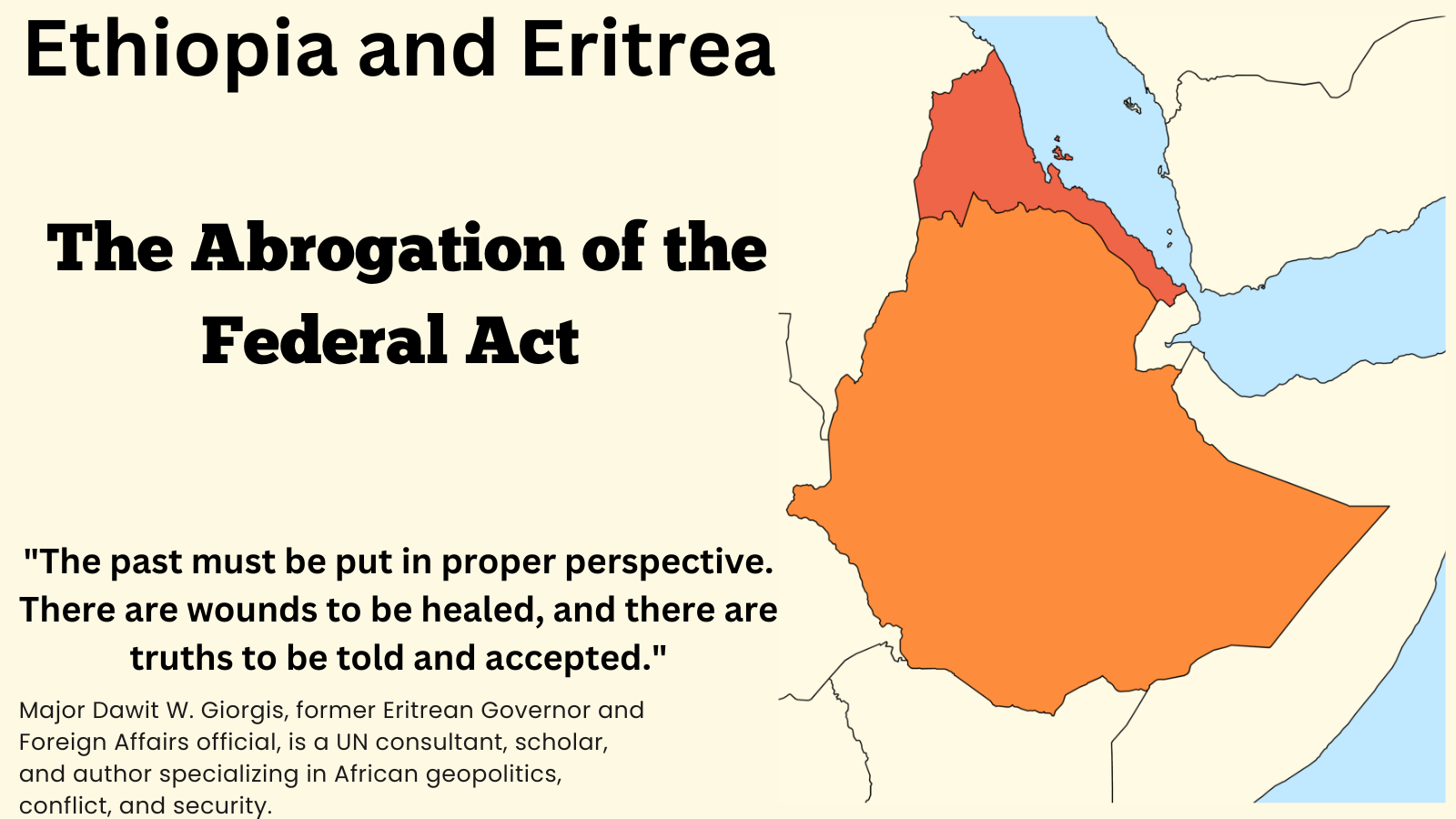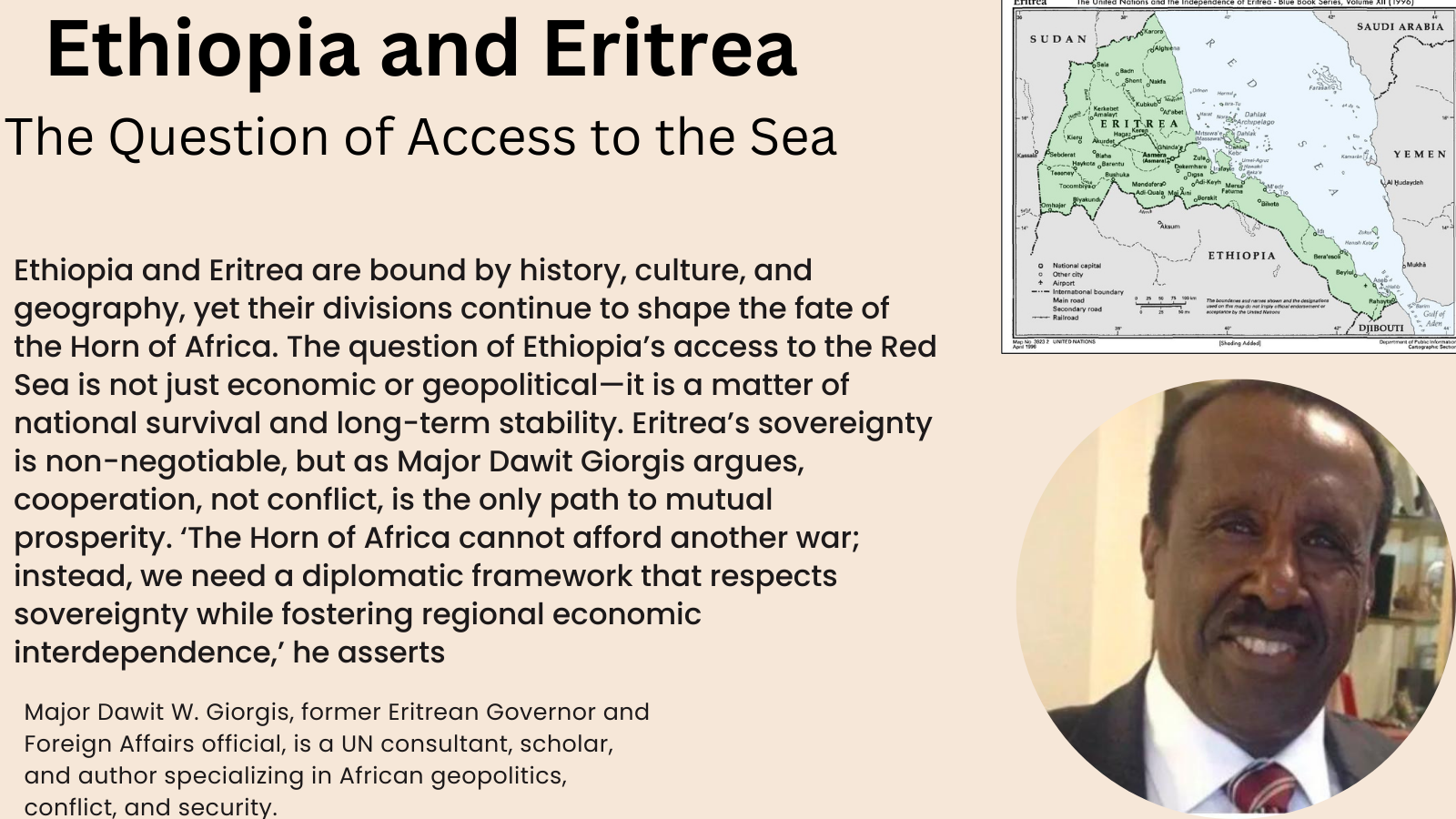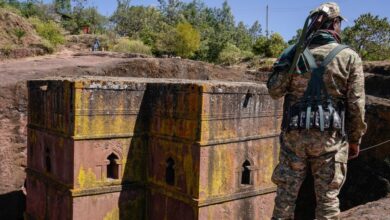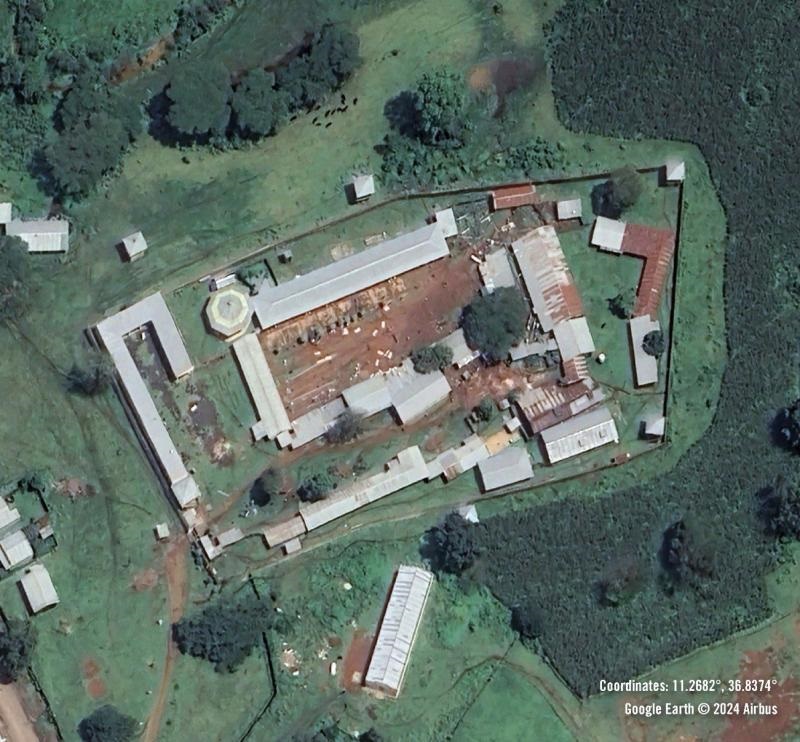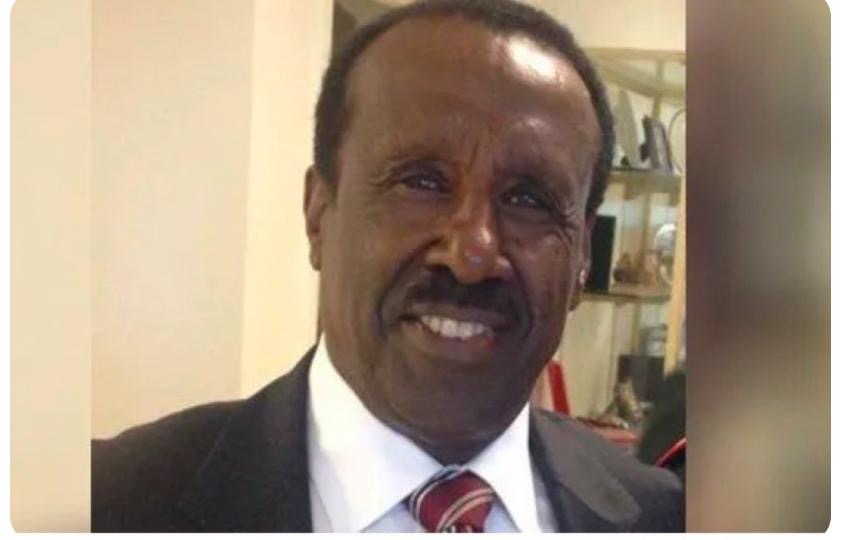
|
Getting your Trinity Audio player ready...
|
Major Dawit Giorgis Responds to Amanuel Beidmariam on Ethiopia’s Access to the Red Sea
I read the article on Nefasitpost, by Ammanuel Beidemariam, in response to an article I wrote in East African Review and Borkena. Sadly, the author wanted to interpret it as an attempt to Fuel Regional Instability. I wrote about Eritrea and Ethiopia from a historical perspective and had nothing to do with politics on regional stability or instability. The author wanted to use my name to write a sensational article that could get him many readers. That is the only motive I can think of. I have written over 50 articles on peace and stability in the region organized and participated in numerous conferences on the subject of peace and development in Africa and particularly in the region.
“Eritrea is a sovereign state with full jurisdiction over its territory, yet that should not prevent discussions on legal and diplomatic solutions for Ethiopia’s access to the Red Sea.” Major Dawit W Giorgis
I have stated in no uncertain terms that Eritrea is a sovereign state that has jurisdiction over every inch of its territory under international law. Having said that, why should discussing historical issues that led to this and possible peaceful options on Access to the Sea be considered as enflaming regional instability? Given this reality of international law, Ethiopians do ask about the historical truth that made Ethiopia landlocked and what options they have to get access to the sea. I have tried to offer options for legal and political settlements, even if some of them appear far-fetched under current circumstances. In subsequent articles, I will address some of the issues that must be dealt with and are critical to help us move forward together to remove fascism, expansionism, and genocide in Ethiopia. Insecurity in Ethiopia or Eritrea would have destabilizing consequences in a perilous way that will go beyond the two countries. Let us shed off the lies used as propaganda during the war for independence and create a social cohesion that will enable us to establish peaceful coexistence, mutual defense, and sustainable development.
False historical narratives about the past have resulted in the suffering of countless innocent civilians in Ethiopia. Whether it is the hateful propaganda of Oromo intellectuals or the branding of Ethiopia as a colonizer, the net effect has been to subject the people to unimaginable suffering and misery and risk the unity of people.
In my book, Red Tears, I have exposed the excesses of Mengistu’s regime and tried to explain how and why many Eritrean youths were forced to join the secessionist movement and why Ethiopia lost the war. After several decades following the independence of Eritrea, we are still expected to accept the lies and propaganda that were used to justify that war. In my frank opinion, it is only detrimental to efforts aimed at building bridges and strengthening relationships among the two brotherly peoples, who have a remarkable shared heritage and have incredible opportunities to work together to forge and shape a better future. In the introduction of this series, taken out from my autobiography (What a Life) published in 2021 I stated:
“Eritrea is an independent sovereign state. Ethiopia and Eritrea have a shared sense of national identity with a common history and ethnic, linguistic, cultural, and religious background, which cannot be undone. The sharing of the many factors of national identity has, will, and should facilitate social cohesion. That is why the war of independence between Ethiopia and the secessionist movement has not significantly affected the social cohesion between the two peoples. It was not a people’s war. It was a war for and against independence between government troops and secessionist forces.
What I present to the young generation in ten short separate articles is what I believe is the truth that the new Eritrean and Ethiopian generations should know: the truth researched, experienced, and discussed as registered in credible books and in international legal documents. The truth can only bring us closer. “Then you will know the truth, and the truth will set you free.” John 8:32. Propaganda and disinformation have always been used as political and military weapons, regardless of country or period of history. Controlling information and the media means ensuring population control because information directly influences our thoughts, emotions, behaviors, and opinions.
Hiram Johnson, a Republican senator from California, is often credited with saying, “The first casualty when war comes is truth” and research has shown that through the ages, war and conflict have always been marked by the use of lies, propaganda, and what we now often refer to as mis- or dis-information. In what is considered one of the foundational texts for understanding modern war and conflict, Clausewitz notes that a ‘great part of the information obtained in war is contradictory, a still greater part is false, and by far the greatest part is doubtful’ (Clausewitz 2017, 46). Many might not like this series of articles because it distorts the narrative that has been told over and over again.
Ethiopians and Eritreans !!! The war for independence is over. The only thing that is left is the current regime in Ethiopia, and we need to deal with it together
Truth-telling is essential to achieving long-lasting peace and relationships. It helps reduce tensions between people and nations, who benefit more from the ties that have bound them for more years than the years of hostility. It is necessary to overcome divisive narratives by establishing an objective account of the violent past. In many post-conflict settings, efforts to establish a reliable account of what happened during the conflict have taken the form of a truth commission. The two people can develop mutual trust and cooperate in many needed areas if they can only agree on what happened. Two independent sovereign countries bonded by history culture, religion, language, and common persistent enemies have all the reasons to succeed. Leaders come and go: Eritrea and Ethiopia will always be there like twins tied at the hips.
My articles might irritate many like Amanuel because they negate the version that has been told over and over again. Read this with good intent and challenge and verify it by reading the references I have indicated. I know the young will have no patience for reading long stories. The truth is derived not from social media but from research and from people who have lived the period. That is why I’ve presented to you short, brief articles in 10 parts. I have told the truth for no other purpose than to bring the two people together. Since modern readers, particularly the youth, don’t read long articles, I have presented to you here brief, intense, and extremely informative articles just for you, young Eritreans and Ethiopians, and students of Eritrea, Ethiopia, and Africa. They are the results of painstaking research written in more detail in my latest book. My interpretation of the facts and the law might be different from some of you. Let us agree on what we can and leave the rest for others to handle and move on.”
“History cannot be rewritten to fit political agendas. My work is rooted in documented facts, international law, and decades of firsthand experience in the region. The war is over, and our responsibility now is to leave behind an informed youth—one that understands history, engages in dialogue, and works toward peace.” Major Dawit
“ Eritrea and Eritreans have always been close to my heart. Most of my friends have been Eritreans, and though death has taken some of those closest to me, I still have some left and cherish those friendships. I have known Eritreans as extremely hard-working, honest, straightforward people. They make friendships easily, and they take those friendships more seriously than most. This was proven to me when I visited Nakfa in 1989, those difficult times amid war when the area was being bombarded night and day by Ethiopian troops. They received me with open arms and hosted me and my delegation for 11 days. What I saw in Nakfa was staggering. I never believed that committed people could do so much. Nakfa was another world beyond what any of us imagined. Though I was still for a unified Ethiopia, the civility with which they welcomed us and discussed sensitive issues is something that has stuck in my mind right up to the present moment. Eritreans fought hard, sacrificed a lot, and they won the war.
Eritrea has taken a considerable time, energy, and passion in my long life. I was there as an officer a few months before the federation was dissolved. I was there as an officer in the Imperial Ethiopian Army for eight years after the federation. Later on in all my other assignments In Ethiopia, Eritrea and the war of secession was a central aspect of my official life as foreign minister and as Commissioner of RRC, and then as Governor of Eritrea for over three years. As governor Eritrea challenged my conscience and I gave it everything that I believed was good for Eritrea and Ethiopia. Eritreans have judged me and from all the information I have from people of the times, I was the best they could have under those circumstances. Though my years there took a lot out of me, I, indeed, gave what I had with good conscience and goodwill for Eritrea to be united in peace with Ethiopia.”
In Part One of this series, I stated:
“But in any case, the TPLF was only the catalyst to finalizing the 30-year war of the EPLF and both had a shared interest: TPLF to replace Mengistus’ regime minus Eritrea and EPLF to takeover Eritrea. There should be no doubt that the EPLF won the 30-year war. The TPLF did not.”
After I left Ethiopia in 1984, I published a book titled Red Tears. In it, I dealt with the Eritrean struggle for independence. Many Eritreans welcomed it because I told the truth. I was also welcomed in Naqfa and noticed that parts of my book were translated into Tigrina and being read to or by people even though I was against the secession of Eritrea from the motherland. After that experience, I wrote articles about the resilience of the fighters. Since then, my relationship with the Eritrean government and Eritrean officials has been warm and very friendly. I have always taken the right stand on Eritrea, and I have never had any conflicts of ideas. The response to Part Four of my series of articles taken from my 2021 book is wrong and misleading. It has been spun to fit into the narrative of those who do not respect the sovereignty and independence of Eritrea and the remarkable cooperation the government has shown towards the integrity of Ethiopia.
In the introduction of this chapter on Access to the Sea, I stated:
“Since there is an inextricable relationship between Eritrea and Ethiopia and enormous potential for prosperity and development in peaceful co-existence, all need to understand the legal limits of sovereign power. Understanding Access to the Sea under International law and the historical facts that created a landlocked Ethiopia is an important element of this peaceful coexistence and social cohesion.”
It is OK to argue on the interpretation of these facts and the law and the understanding of people then and now but to accuse me as a warmonger is out of line. It is wrong to educate responsible people to push back against healthy discussions. I am not that person. I have paid a huge price for the good and the right thing that I have done for Eritreans.
My article does not suggest territorial acquisition. I wrote:
“ Eritrea will continue to have complete sovereignty over every inch of its territory. At this point, one way that the argument over access to the sea can be addressed is through the Convention on Transit Trade of Land-locked States, which says that landlocked countries must be granted free transit through neighboring states and free access to the sea. According to the Convention: “The terms and modalities for exercising freedom of transit shall be agreed between the land-locked States and transit States concerned through bilateral, subregional, or regional agreements.” In the case of Ethiopia, this ‘free transit’ option is not limited to Eritrea alone but to all its other four neighbors.”
I have dealt with some critical issues raised by Ethiopians and dealt with them appropriately. One is the role of the TPLF in the independence of Eritrea. Eritrea won the war. The process in which it was formally recognized as an independent sovereign state and member of the United Nations was enabled by the TPLF. In the UN document entitled “ The United Nations and the Eritrean Independence,” the then Secretary General Butros Butros Ghali writes:
“Shortly after the July 1991 Conference on Peace and Democracy in Addis Ababa, the Secretary-General of the Provisional Government of Eritrea, Issaias Afwerki, in a letter to my predecessor dated 25 July, invited the United Nations to become involved in the referendum process. My predecessor responded in a letter dated 18 September 1991, stressing that the requirements for the Organization’s participation included the agreement of Ethiopia and a clear mandate from the competent organ of the United Nations. (underlined by me). Ethiopia’s consent was forthcoming in a letter dated 13 December 1991 from the President of the Transitional Government, stating that the United Nations “should play an active role in verifying that the referendum” was free and fair. The Organization, he continued, should “initiate appropriate measures to enable the United Nations to play this role and make the necessary arrangements with the Provisional Government of Eritrea to facilitate the ways and means for United Nations supervision of the referendum”. Following receipt of the letter, contacts were undertaken with the Transitional Government of Ethiopia and the Provisional Government……”
If the TPLF had not allowed the referendum and accepted the results, the UN would certainly not have recognized the independence of Eritrea and approved its application for membership in the United Nations at that time. It is a matter of speculation as to what would have happened. We would not know, but what is certain is Eritrea would not have been recognized by the UN in the manner and speed that happened.
I cannot write your version of history. All the facts I have stated have credible and legitimate sources. I have not lied, and I have not fabricated or revised history. As a visiting scholar in four highly esteemed universities and foundations, I have abided by scholarly ethics. I don’t peddle lies, and I don’t represent any party. As you correctly stated, I am an old man as old as the President of Issaias. Yes, and have exceptional experience in Africa and the region. Few have the experience that I have. Not because I am smarter but because circumstances have put me in critical places at critical times in history. I wanted to put on record that experience before I expire, which would not be far away. So, I wrote my book; What a Life; and these articles with no malice but to leave behind a testimony and talking points based on what I lived through. Why is it not right to allow the youth of both countries to discuss their past? The war is over. Our responsibility and our legacy is to leave an informed youth on the path of peaceful coexistence. The youth of our respective countries will eventually catch up with the truth through simple research. Let us do our part by opening a healthy discourse.
“Ethiopia and Eritrea must move beyond past grievances and engage in honest dialogue. My intent is not to rewrite history but to uncover the truth, foster mutual respect, and encourage strategic cooperation. Only through understanding and diplomacy can we build a future of lasting peace and shared prosperity in the Horn of Africa.” Major Dawit Giorgis
Editor’s Note: The views expressed in articles published by East African Review are those of the individual authors, institutions and do not necessarily reflect the perspectives of the editorial team or East African Review as an organization. The publication of any Op-Ed piece does not imply endorsement by East African Review.—please feel free to share them in the comments section below or email us at [email protected].

